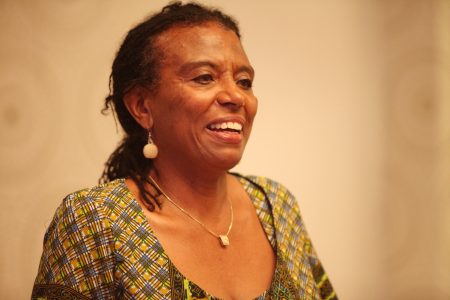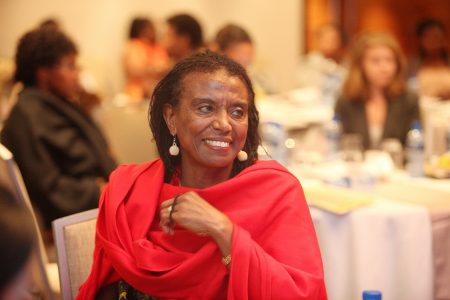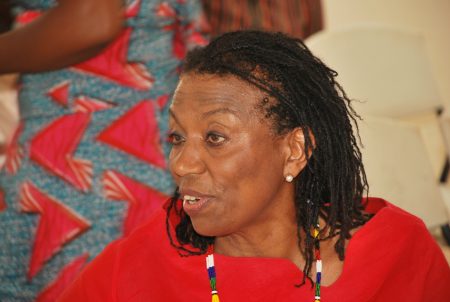Tributes to Joana Foster: A Life Remembered.
Remembering Joana Foster: A friend and sister in her unwavering commitment to Feminism.

By Hilda Tadria
I had an opportunity to talk to Joana in August 2016 and she was in high spirits, attending a farewell party organised for her by friends in London. She told me she was enjoying herself, dancing; and indeed she had her laughter. I was amazed and told her my conversation with her had taught something about living positive. In our October AWDF Board meeting we were told there are some promising developments. I felt somehow hopeful. Then Saturday 6 November 2016, I receive a call from Theo Sowa without warning (Theo always warns me when she is planning to call). I was sure she had bad news when she asked me if I was at home and told her to come out with it; she wanted to know whether I was alone. I have to be frank, am glad I was alone that night so that I did not have to restrain myself in mourning for my friend.
Since then, I have been mulling over what to say about Joanna. Let me talk about her as I have known and experienced her. She and I met in what could be described as an unlikely place. We met in Dakar, Senegal by sheer destiny. In 1994 African women merged in Dakar to prepare for the famous Beijing Conference. That meeting is etched in my memory for two reasons. The fist reason is the total lack of order in a meeting where 2000 women turned up; most of them unexpected. AS I sought an explanation for the chaos, I was told it was the lack of resource.
I found myself looking for answers as to where African women could access resource for future organising. So when I saw a flyer from Global Fund for Women advertising a training on resource mobilisation; I decided that is the place I would spend my time. I found the allocated room and took my place in a circle of other women and prepared to pay attention. A few minutes after settling in, I looked around the room, and there across was this pretty woman with the most engaging smile. It was surely meant for me; I smiled back. Each time an important point was made, this woman and I would look at each other across the room , nod and smile at each other. When the session was over, we zoomed across the room and introduced ourselves. I remember we held hands as we walked out and as soon as we were out of other people’s hearing, looked at each other and in Unison said “we can do this”.
Joana and I were inseparable during the rest of our time in Dakar, planning how to start a Fund for African Women. By the time we left Dakar we had managed to get a commitment from Global Fund to give us the seed grant we needed to develop the proposal and launch the organisation. Not long after, we met with Bisi Adeleye –Fayemi who had been working on a similar plan to start a Fund. The three of us are pragmatists; we soon became a trio; and we had never separated. Our togetherness, no matter what has remained firm in spite of the challenges we have encountered; Three women, Three countries bound by a common vision and driven by feminist passion.
Now Joana has been plucked from us but I will always remember that first meeting and the engaging smile that told me ‘you are the one I want to work with’. I will remember her for her positive outlook on life; she was not willing to be brought down by events that could be managed by dialogue. Joana was elegant ; a small woman with a big heart always ready to share knowledge and gifts. I and the African women will remember her for the light she shone on women’s rights.
Joana Silochina Foster (1946-2016)

By Bisi Adeleye Fayemi
I first met Joana Foster at an international conference on Violence Against Women, which took place in Brighton, England in November 1996. I took my son with me to the conference, and he fell ill. As I fretted over my son, Joana fussed over me. After Brighton, Joana and I became firm friends. She was a mother-figure, auntie and friend. At the time we met, she had just become the Regional Coordinator for Women in Law and Development in Africa (WILDAF), one of the leading women’s rights networks in Africa. She was based in Harare, Zimbabwe. Anytime she was in London, which was often, because her daughter Helen lived there, Joana would get in touch and we would meet up.
In March 1998, Joana stopped over in London on her way to attend the annual United Nations Commission on the Status of Women in New York, the meeting known in the international women’s movement as CSW. I was going to attend the CSW that year as well, and we were booked on the same flight out of London. The day before, we met up for lunch at a restaurant near AMwA’s office in Holborn. As we walked down the street, we were comparing notes and sharing our frustrations dealing with our respective donor agencies. I was telling her about my experiences with a funder who had sat on our proposal for eighteen months only to turn around and give a ridiculous excuse for rejecting the funding request. I ended my rant with, ‘It is about time we started our own fund as African women’. Joana stopped in her tracks. ‘What fund’? she asked. ‘An African women’s fund’ I said. She laughed and said, ‘Welcome on board. We already have a fund’. Prior to that conversation, AMwA had been planning to start a fund for African women, as a logical step from the work we were already doing, running capacity building programs for African women and facilitating advocacy opportunities. Joana Foster and Dr Hilda Tadria had started working on the idea of an African women’s fund as far back as 1994, based on inspiration Joana had drawn from attending a workshop organized by the US based Global Fund for Women. ‘African women can do this’, Joana said to herself, and she managed to convince Dr Tadria to join her. Both of them did some planning and consultations, but the timing was not quite right. Dr Tadria was working with the United Nations Economc Commission for Africa (UNECA) in Addis, and did not have much time for additional endeavors. Joana was Ghana Country Director for CUSO, a Canadian NGO at the time, then she left to become Regional Coordinator of WILDAF in Zimbabwe. The idea of the fund for women in Africa was put on hold. After our March 1998 discussion, Joana, Hilda and I decided to join forces and the two separate ideas for a women’s fund in Africa became the African Women’s Development Fund. I left London in 2001 to move to Accra where we had decided to locate the fund, and Joana finished her term at WILDAF and returned to Ghana. I became the Executive Director of AWDF and Joana was the Chair of the Board.
AWDF could have been based anywhere in Africa, since it was an Africa-wide foundation. Several countries met our objective criteria – an enabling political environment, a vibrant women’s movement, a favorable banking system that would allow the flow of money in and out of the country and so on. For me, what clinched the deal for Ghana was the fact that not only was it close to Nigeria, since I did not want to live too far away after being out of Africa for so long, it was Joana’s home. Auntie Joana was my mother and my friend, so it was a no brainer. Ghana it was.
I learnt a lot from Auntie Joana. We spent a lot of time together travelling, attending meetings and planning for AWDF. She was always full of enthusiasm, joy and energy. She loved to cook, garden and dance, and she enjoyed good wine and tea. She was also a very elegant woman who took a great deal of pride in her appearance. She was also a very healthy eater.
When I arrived in Accra, April 2001 to start work at AWDF, I stayed with Joana for the first month. We had so much fun together, setting up AWDF, recruiting staff, looking for a place for me to live, and planning for the future. After all the various journeys the idea had taken, AWDF was formally launched in June 2000 in New York at the Beijing plus 5 Review Conference, with an Africa launch in December 2001. Five years after the Beijing conference, African women were proud to celebrate a concrete achievement, and Joana Foster was key to that. Sixteen years later, AWDF is globally acknowledged as a key player in the international philanthropic movement, having funded over 1,200 women’s organisations in 42 African countries. In spite of the many difficulties involved in raising significant funding for grant making and operations, AWDF continues to grow and its influence in the field of feminist philanthropy is undeniable. Joana’s dream of a well-respected foundation for African women came true.
Joana had a very cosmopolitan upbringing and outlook. Born of a Ghanaian mother and Indian father, Joana understood what it was like to manage diversity from a very young age. She had a wide family network which included Ghanaian, Indian, Lebanese and English relatives. When I was out with her in Accra, she would always make stops to see one family member or the other. She was a very generous person and was always giving something to someone. Once, on a visit to Harare, I had admired a porcelain dinner set made by local potters. Joana made arrangements to have a dinner set shipped to Accra for me. Her training as a Lawyer provided the backdrop for a life-long devotion to social justice and women’s rights issues, which took her to many countries around the world as a policy advocate, organizer and administrator.
Joana and I did not always get on. This is to be expected when strong women from different generations work together. In spite of the occasional wrinkles in our relationship, our love for each other was never in doubt. When Joana moved from Ghana to Liberia to work for the UN, I missed her a great deal. I missed her comforting presence in Accra, and I missed her as a travelling companion. I stayed with her in Monrovia when I went for the inauguration of President Ellen Johnson Sirleaf in January 2006. I asked Joana if she needed anything from Ghana, and she said I should bring her some tomatoes! I have a policy of not travelling with food items because I do not want to subject myself to the scrutiny of customs officers anywhere in the world. However, I could not think of saying no to Joana, so I hauled a large carton of tomatoes to Monrovia. Fortunately, the customs officers were too busy receiving the free CDs of the famous Liberian singer Miatta Fahnbulleh’s special recoding we had sponsored for the inauguration, that they ignored Joana’s tomatoes.
Joana told me she was ill with cancer in 2014. Over the past two years I have followed the progress and setbacks of her treatment through visits to her in London, emails and phone conversations. The last time I saw her was in August 2016 in Accra. She had come home to put her affairs in order. She was very frail, but still had a sparkle in her eyes and her sharp wit. She told us that she was going to attend her own wake in London before she passed away. ‘ I am going to be there for my own wake. No one is going to have more fun than me’ she declared. That was vintage Joana. Warm, funny, smart, loving, generous, optimistic. She passed away quietly in London the afternoon of Saturday November 5th2016.
One of Joana’s favourite saying was, ‘We have to do something’. That is what Joana spent her life doing. Something, and a whole lot more. I will miss my mother, sister and friend. I will miss one of the greatest feminist activists I have had the pleasure of working with and learning from. Rest in peace Auntie Joana. We will continue to ‘do something’.
Bisi Adeleye-Fayemi is a Gender Specialist, Social Entrepreneur and Writer. She is the Founder of Abovewhispers.com, an online community for women. She can be reached at BAF@abovewhispers.com
An unforgettable friend and mentor.

by: Comfort Lamptey
I still vividly remember the first day l met Auntie J, some 21 or so years ago. I was in Accra to attend a workshop being organized by Cuso, the organization she was heading at the time. I remember the classy, beautiful cloth she wore that day, her stylishness, and her captivating smile, as she walked into the conference room. We became friends instantly. She took me under her wings and nurtured and mentored me to the very last day I saw her on 23 September 2016 in London. I will forever cherish that short walk we took together from her flat to Willesden Green station, where we said goodbye.
Auntie Joana taught me so many enduring life lessons. She taught me not to take myself too seriously; she taught me that the fight for social justice and gender equality requires stubbornness, a sense of humor and a very thick skin; she taught me the importance of always maintaining a spirit of youthfulness. Over the years, she introduced me to so many people and places in Ghana, as l sought to re-establish a life there after many years abroad. We had lots of fun together. But by far, the greatest lesson Auntie J taught me was that even when confronted with the most daunting and devastating news, as she received in the final few months of her life, it is possible to face this with grace and dignity and to uphold a positive spirit to the end.
A standard-setting peacekeeper
Auntie J was a pioneer and trail blazer. I has a close-up view of this during the period we worked together as gender advisers in the field of UN peacekeeping. Whilst working as a senior gender adviser to the UN peacekeeping mission in Liberia, Auntie J broke new ground in a number of important areas which had far-reaching effects on global peacekeeping practice, and which also helped to advance the push for women’s rights in Liberia. As an example, she advocated strongly and successfully with the mission leadership to ensure that thousands of girls who played support roles with the fighting forces in the war were not ignored, but got support as part of the disarmament, demobilization and reintegration process (DDR). The formal recognition of the category of Women Associated with Fighting Forces (WAFFs) in UN DDR parlance, took root in Liberia as a result of the formidable work done by Auntie J and her colleagues.
She also educated the mission on the value of using sex disaggregated data to enhance operational success. This was clearly illustrated during the first voter registration process which took place in post-war Liberia in 2005. Through a gender analysis she undertook with the team on the number of registered voters, it became apparent that less than a third of eligible women had registered to vote. She subsequently mobilized the mission to devote resources to support the Ministry of Gender and women’s constituencies across the country to launch an all-out ‘register to vote’ campaign, targeting women. The results were impressive, as the final count of women who registered to vote , exceeded 50 percent, a factor which helped to propel the first woman President into office in Africa.
As a strong supporter of civil society activism, Auntie J understood the importance of strengthening the women’s civil society movement in post-war Liberia, to enable them to be better-positioned to engage as partners with government in the reconstruction of the country. To this end, she provided strategic technical guidance and resources to support the establishment of the Women’s NGO Secretariat of Liberia (WONGOSOL) as an umbrella entity to support effective planning, resource mobilization and coordination of the work of women’s NGOs in Liberia.
Through these and other efforts, Auntie J left an indelible mark on UN peacekeeping practice, by showing how the use of a gender lens can enhance both operational effectiveness and women’s empowerment in a fragile post-conflict context.
I thank God for Auntie J’s life, for all she taught me and the countless other younger women she mentored, and for the privilege of counting her as a friend and as family.
Thank you, Auntie J. I hope to be able to honor your legacy everyday by championing the causes you believed in and worked for throughout your life. Wɔ ojogban (Rest in Peace)!
